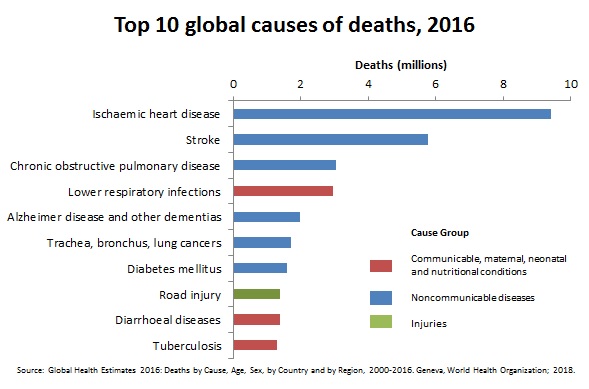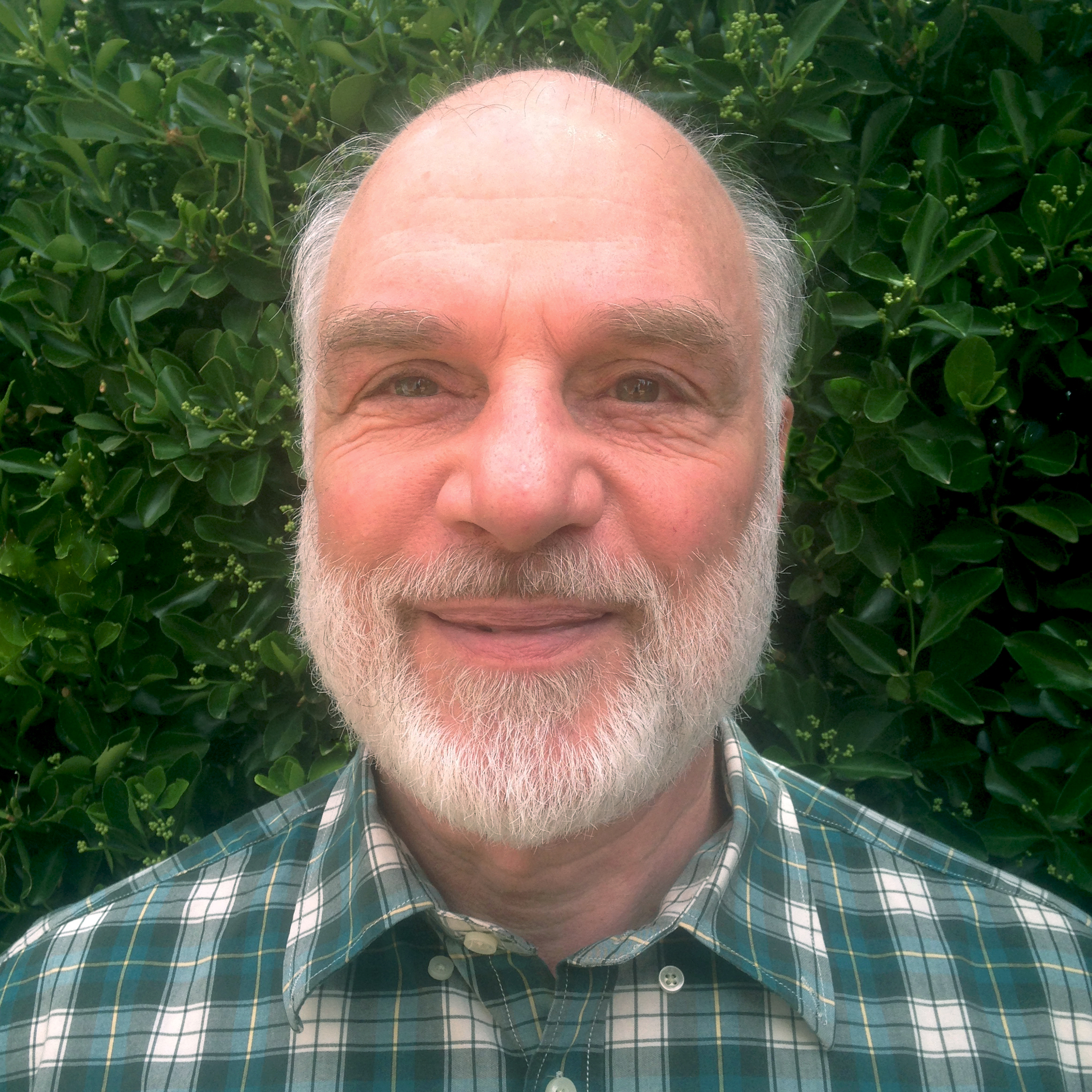Posted by Horton Tatarian, research biochemist, on 18th Apr 2018
Worldwide Disease and Premature Death

Statistics On Disease And Death
The World Health Organization (WHO) publishes a fact sheet on the top ten causes of death each year.
As with prior years, their latest report lists ischemic heart disease as the leading cause of death worldwide. Stroke is next, followed by lung diseases, diabetes, and dementia.
Here's their January 2017 report:
Of the 56.4 million deaths worldwide in 2015, more than half (54%) were due to the top 10 causes. Ischaemic heart disease and stroke are the world’s biggest killers, accounting for a combined 15 million deaths in 2015. These diseases have remained the leading causes of death globally in the last 15 years.
Chronic obstructive pulmonary disease claimed 3.2 million lives in 2015, while lung cancer (along with trachea and bronchus cancers) caused 1.7 million deaths. Diabetes killed 1.6 million people in 2015, up from less than 1 million in 2000. Deaths due to dementias more than doubled between 2000 and 2015, making it the 7th leading cause of global deaths in 2015.
Lower respiratory infections remained the most deadly communicable disease, causing 3.2 million deaths worldwide in 2015. The death rate from diarrhoeal diseases almost halved between 2000 and 2015, but still caused 1.4 million deaths in 2015. Similarly, tuberculosis killed fewer people during the same period, but is still among the top 10 causes with a death toll of 1.4 million. HIV/AIDS is no longer among the world’s top 10 causes of death, having killed 1.1 million people in 2015 compared with 1.5 million in 2000.
Road injuries killed 1.3 million people in 2015, about three-quarters (76%) of whom were men and boys.
Epidemic Artery Disease
Let's look at the two leading causes of death, ischemic heart disease and strokes. Impaired arteries cause both of these problems.
Arterial Plaque
In most cases of arterial disease, the arteries have plaque-forming deposits that reduce blood flow. The plaques are made of cholesterol, calcium, dead cells, scar tissue, and other matter.
The artery hardens from the growth of scar tissue and accretion of calcium. So, "hardening of the arteries" is one name for the affliction. Atherosclerosis is the medical term for the disease.
The Consequences Of Arterial Plaques
Arterial plaques reduce the flow of blood through the artery. In time, as the lumen of the vessel narrows, the blood flow may stop.
In the heart, reduced blood flow leads to "ischemic heart disease," which impairs heart function and can be painful. A heart attack occurs when the blood flow fails.
Likewise, in the brain, reduced blood flow can lead to a type of dementia called "vascular dementia," which reduces brain function but is painless. A stroke occurs when the blood flow fails or the artery ruptures and bleeds.
The Reversal of Artery Disease
Arterial Plaque Reversal
Some specialists know how to stop plaques from forming in arteries. Also, they know how to reverse the process.
[Atherosclerotic] plaques are highly dynamic, and are able to progress, stabilize or regress depending on their surrounding milieu.
This course will show you the conditions that form arterial plaques and how to avoid them. Also, you will learn how to reactivate your body's healing processes to reverse them.
Arterial Relaxation
In some cases, the flow of blood through an artery may slow or stop without plaques or other apparent disease. This occurs from a spasm of the artery's layer of muscle tissue.
In the heart, an arterial spasm causes chest pain (angina) or a heart attack. In the brain, a "transient ischemic attack" or stroke results.
By restoring overall health, arteries relax for optimal blood flow, which eliminates problems with arterial spasm.
Death From Prescribed Drugs
In the United States, the rankings for cause of death are different from the global statistics. Here, the toxic effects of prescription drugs are the fourth leading cause of death.
Illnesses and deaths from the toxicity of drugs are called "adverse drug reactions" or ADRs. The Food and Drug Administration (FDA) states that ADRs are ahead of deaths from lung disease, diabetes, AIDS, pneumonia, accidents, and automobile crashes.
Reasons For Drug-Induced Deaths
The FDA offers two reasons why there are so many adverse drug reactions.
- Doctors prescribe more drugs than ever before. Patients receive at least one prescription 2 out of 3 times they visit a doctor.
- Doctors ask patients to take longer lists of drugs, more than ever before. When a patient takes four or more drugs, the risk of an adverse drug reaction grows fast.
The use of several or many drugs in one patient is common in the United States. Professionals call this practice polymedication or polypharmacy.
Why Drugs Are Over-Prescribed
The over-prescribing of drugs occurs in two ways:
- Doctors diagnose a health problem and prescribe one or more drugs for it based on the guidelines they are given. So, patients may get quite a few prescriptions when they have several problems.
- Patients ask their doctor if a drug "is right" for them, as seen in advertisements by drug companies. The patient's interest in the drug encourages the doctor to prescribe it.
How To Avoid Drug Reactions
About half of the adverse drug reactions that occur in older patients are avoidable.
Of course, adverse reactions would end if drug usage ceased, but few doctors know of alternative ways to deal with health problems. Also, some drugs appear to be indispensable.
There are two ways that doctors can reduce illness and death from drug reactions:
- Prescribe more carefully
- Prescribe fewer drugs
Suggested Actions
Articles in medical journals encourage practitioners to use restraint when writing prescriptions.
Other articles ask prescribers to increase the patient's role in the decision to take drugs that could prove dangerous.
If you are taking drugs of any kind, check on your risk of adverse drug reactions. If needed, consider asking someone to help you.
The site
www.drugs.com shows drug information within the limits of their disclaimer. Check on each drug you are taking. See if any of the reported adverse effects match the symptoms that you may have. Also check for the three types of drug interactions:
- Drug-drug interactions
- Drug-food/beverage interactions
- Drug-disease interactions
What you learn at www.drugs.com or similar sites may give you a reason to initiate a visit with your doctor. If your goal is to phase out unnecessary drugs, listen to your doctor's instructions. Some drugs cause death when discontinued suddenly.
About Horton Tatarian

I’m a biochemist who examines scientific findings on health and disease. My degree in biochemistry is from U.C. Berkeley. UCLA School of Medicine granted an M.D. degree in 1974. Since then, independent research prepared me to advise clients on natural ways of self-care.

